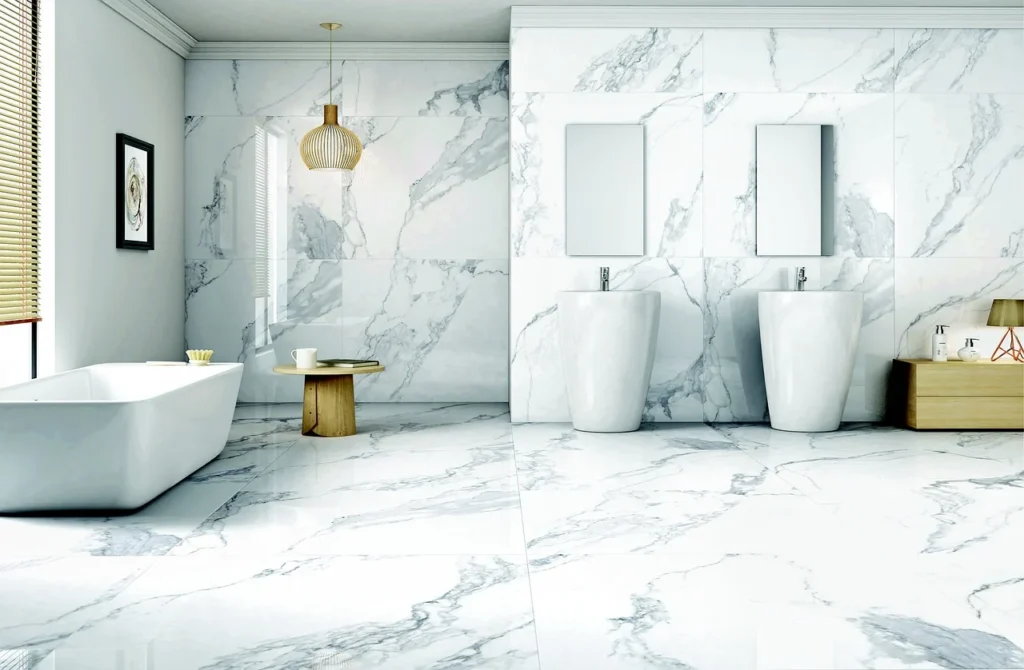
Choosing bathroom flooring is one of those pivotal decisions homeowners face during renovations. It’s not only about design and day-to-day comfort. Your selection affects functionality, durability, and, of course, your budget. When considering bathroom flooring costs, a broad spectrum of options is available, each tailored to different needs and budgets.
The Realities Behind Bathroom Flooring Cost
Bathroom flooring prices can range from surprisingly affordable to truly luxurious. In some cases, you might find materials for as little as $0.50 per square foot, while high-end designer tiles or natural stone can climb to $50 per square foot or even more. For most homeowners, a realistic renovation budget for bathroom flooring typically falls between $750 and $5,800, covering both materials and installation costs.
What accounts for this dramatic price difference? The answer lies in the type of material, installation complexity, bathroom size, and the state of your existing floors. Let’s break it down:
Factors That Shape the Price
- Bathroom Size: The larger the space, the greater the cost—not only for the materials but also for labor. Renovating a standard 5’x8′ bathroom usually costs between $450 and $1,150 for the flooring alone. Master bathrooms, which are often much larger, can easily surpass $5,000.
- Material Choices: Your flooring choice has the single most significant impact. Standard vinyl may cost between $0.50 and $4.00 per square foot, while ceramic tile typically ranges from $1 to $15, and high-end marble can cost up to $50 per square foot.
- Labor vs. Materials: Many are surprised to learn labor usually makes up the bulk of bathroom flooring cost, sometimes as much as 69%. Materials typically account for approximately 31% of your budget. Skilled installers charge anywhere from $40 to $100 per hour, especially for complicated jobs.
- Demolition & Prep: If your current flooring needs to be removed or the subfloor requires repair, expect an extra $1 to $5 per square foot for demo and up to $1 per square foot for subfloor work.
Entry-Level: Affordable Options That Shine
If you’re looking to save, vinyl and laminate are hard to beat. Sheet vinyl is especially popular for its seamless, waterproof surface, which is excellent for bathrooms with constant moisture. Peel-and-stick vinyl tiles are even more affordable and allow DIY installation, which can cut hundreds from your final bill.
Laminate, with its convincing wood look, ranges from $1 to $5 per square foot. However, for bathrooms, especially full baths, opt for waterproof or water-resistant variants and keep moisture at bay with caulk and proper ventilation.
Mid-Range: The Sweet Spot Between Value and Style
Luxury vinyl plank (LVP) and luxury vinyl tile (LVT) have experienced a surge in popularity. Running around $2.50 to $6.00 per square foot for materials, they are 100% waterproof and durable and available in finishes that mimic the look of stone or wood installation, whether click-lock or adhesive, generally adds $3 to $10 per square foot.
Ceramic tile remains a classic favorite. It delivers durability, custom design, and water resistance, making it ideal for damp bathrooms. Expect material costs to be between $2 and $10 per square foot, plus labor costs that vary widely depending on the design complexity.
Engineered wood crafted with a plywood base and hardwood veneer offers the warmth of real wood with improved moisture resistance. Proper sealing and underlayment keep it functional for years.
High-End Splurges
Elegant bathrooms often feature premium materials, such as natural stone (marble, travertine, or slate) or top-of-the-line porcelain. Marble’s unique veining offers unparalleled luxury but at a steep cost: $5 to $40 per square foot for materials and even more for intricate installation.
Porcelain, though technically a type of ceramic, is much denser. Its durability and design versatility make it a favorite in upscale renovations. Its cost ($3 to $20 per square foot) reflects both quality and longevity.
For those chasing the ultimate comfort, radiant heating beneath tile or stone adds warmth and value.
Installation: DIY vs. Professional
Some homeowners consider DIY projects to save money (potentially $300–$1,000 on total job costs). However, bathrooms present unique challenges, including water barriers, specialized tools, and subfloor preparation. Mistakes can quickly outpace initial savings, leading to costly repairs.
Professional installation, while an upfront investment, brings peace of mind. Installers offer warranties and complete projects quickly often in just a few days.
Lifetime Value and Maintenance
Durability and maintenance are just as important as the purchase price. Vinyl requires little attention, while tile and stone must be resealed and cleaned with compatible products. Repairs for damaged tile or subflooring are more costly than tactically replacing a sheet of vinyl or a few planks of LVP.
Final Thoughts
Bathroom flooring cost is as much about long-term value as the ticket price. The smartest choice depends on your needs: budget-friendly vinyl for no-fuss families, mid-range ceramic or LVP for a solid return on investment, or natural stone for a luxurious look. Whatever your choice, investing in professional installation and proper maintenance ensures your bathroom floor remains beautiful and functional for years to come.
If you’re ready to compare exact figures and materials, a bathroom flooring cost breakdown tool can help you make the most informed decision for your renovation.